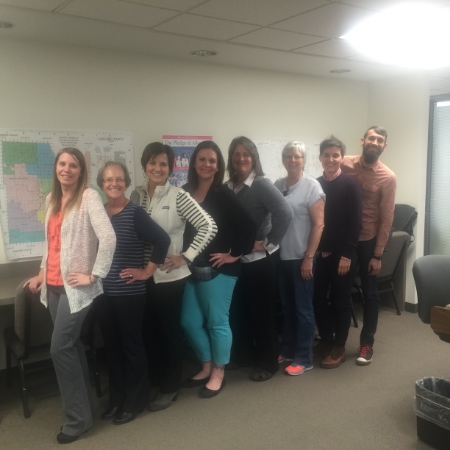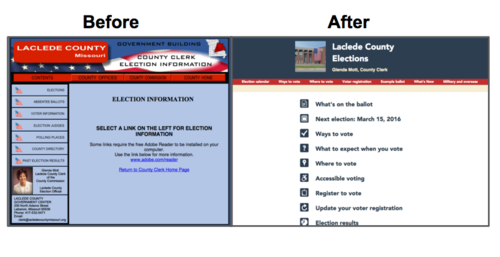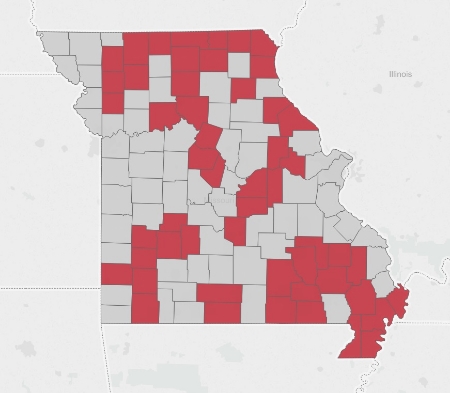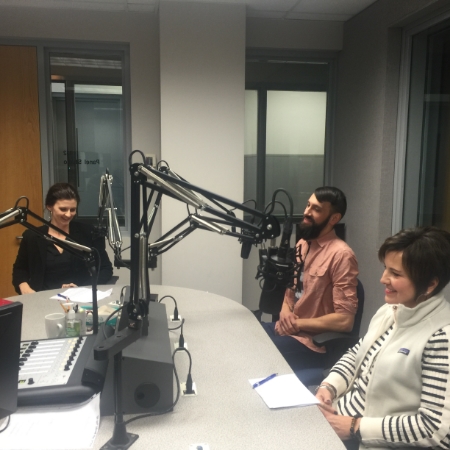Working to Close Civic Information Gaps in Missouri
Although once French territory, Missouri is now synonymous with middle America. In fact, the mean center of U.S. population is located here, in a tiny town called Plato. It’s also the home of jazz, barbecue, the Gateway Arch, and 5 major league sports teams.
Missouri is famously known as the Show Me State, but how well is it doing when it comes to showing important election information to voters?
It’s true that the starting point for the Pony Express was located here, but in the twenty-first century Missourians deserve to have some faster communications tools in place. We’ve recently done research on Missouri that demonstrates that there are some big gaps when it comes to providing civic information in the state. Fortunately, there are folks working to close them.
In particular, we were encouraged by the work of Laclede County Clerk Glenda Mott and her staff. With the help of our election website template, Laclede County is providing essential election information to the community. Along with Glenda, we had the opportunity to tell the story of Missouri’s election websites – or the lack of them – to radio listeners in the Ozarks region.
Laclede County votes
We first met Glenda at the 2015 Midwest Election Officials Conference in Kansas City back in October. She asked our team to do an assessment on her current election website, and we found that their old site wasn’t terrible, but it did leave some things to be desired. For instance, we found that the site didn’t answer important voter questions like “When’s the next election?” and “What’s on the ballot?” On top of that, Glenda’s staff told us they felt the site was hard for voters to navigate and hard for them to update and maintain.

Glenda decided that she wanted to create a new election website for Laclede County, and we agreed to travel to her office in Lebanon to train her staff and help them get their new site off the ground. This in-person training meant that not only would voters get a new election website, but the Laclede County Clerk’s staff would also learn some new skills regarding web publishing and providing civic information.
The Laclede staff members were hard workers, and soon www.lacledevotes.org debuted!

Missouri’s civic information gaps
In preparation for our trip to the Show Me State, we did some research on the presence of election websites in the state, and we found that there are many places in Missouri that are a lot worse off than Laclede County was.
We repeated the study we did on Illinois a few weeks ago for Missouri. But this time around, we started with 2012 website-presence research done by the Center for Civic Design, and we updated it. It seemed fair to assume that jurisdictions that had election websites in 2012 would still have them, so we focused our attention on those jurisdictions that didn’t have a site in the earlier CCD survey.
We also took a hard look at a number of election websites that CCD had described as “minimal.” In some cases, we felt that they were so minimal as to not qualify as an election website. We made the judgment to define an election website as a dedicated page, or collection of pages, that provides more than just one or two pieces of election information. In other words, we decided that a county clerk site that just posts election results or provides a link to the Missouri Secretary of State’s “Voter Registration” page shouldn’t qualify as an election website.
Ultimately we found that of the 115 local election authorities in Missouri, 52 – or 45% – do not have an election website. This is actually a much higher number than we found in Illinois, where the figure is about 32%. Below is a map showing, in red, the counties without election websites.

Unlike Illinois, there doesn’t seem to be a regional pattern to explain which Missouri counties lack an election website. The 52 counties are in the north, south, and central regions of the state. The only noticeable trend in the geographic distribution is that the areas surrounding Missouri’s major metro areas – St. Louis and Kansas City – have websites in place to help voters.
Like we saw in Illinois, population seems to play the biggest factor in predicting whether or not a county will have an election website. Of the 20 counties with the highest population, only 2 (10%) don’t have a website. On the other hand, of the 20 least populated counties, 15 (75%) have no election site. All told, this means that there are approximately 865,652 Missourians living in a county without an election website. That’s a little more than the population of the city of San Francisco.
Fortunately, Laclede County provides a great model for local government taking charge to help provide voters with more civic information. We believe these 52 counties – where the need is even more urgent – can follow in Laclede’s footsteps.
Taking it to the airwaves
While visiting Missouri, we were invited to appear as guests on the weekly radio show Making Democracy Work, which is produced by the League of Women Voters of Southwest Missouri along with KSMU radio in Springfield.
Our Government Services Associate, Kurt, appeared on the show along with Glenda. Allison Cash of the League was the interviewer, and she asked questions about CTCL, the new website being built by the Laclede County Clerk staff, and the broader problem of election websites in Missouri.

Allison asked about the presence of election websites in Missouri. “There’s a big problem of civic information in this state,” Kurt suggested, citing the number of counties without sites.
Glenda emphasized the goal of better serving the community and supporting voters. “Most voters want to quickly look at this information and move on with their lives,” Glenda explained. Having a site where answers to common voter questions are easy to find, Glenda said, “is really going to position us better for the 2016 election.”
The interview broadcast on KSMU on December 14. You can listen to it by visiting the KSMU website.
All in all, our work in Missouri identifies challenges as well as solutions. We found some big gaps when it comes to providing civic information in the Show Me State, but we also met smart, hardworking public servants and advocates who want to do their part to bolster informed participation in the democratic process.
If you want to read more about the election website template and training options that we offer, visit our professional development courses page. With questions about our research on Missouri, reach out to Kurt at [email protected].